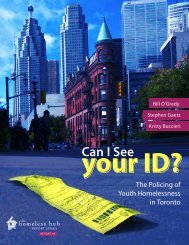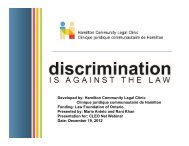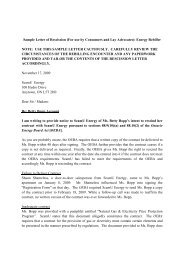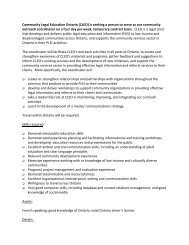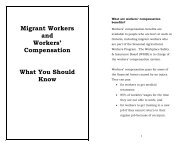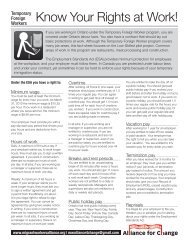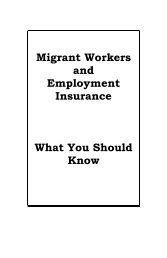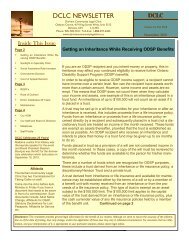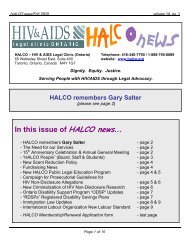Canadian Centre for Elder Law A Practical ... - Your Legal Rights
Canadian Centre for Elder Law A Practical ... - Your Legal Rights
Canadian Centre for Elder Law A Practical ... - Your Legal Rights
You also want an ePaper? Increase the reach of your titles
YUMPU automatically turns print PDFs into web optimized ePapers that Google loves.
!The legislation governing, respectively, occupational therapists and dental hygienists,confirms the ability of the health professional to breach confidentiality, called secrecy inQuébec, where “to prevent an Act of violence, including suicide… where there is animminent danger of death or serious bodily injury” (OT Code, art. 3.06.07, Hygienists’Code, art. 32.1). The Professional Code, which applies to nurses and lawyers, containsan identical exception to confidentiality (art. 60.4). This same section affirms solicitorclientprivilege.The Code of Ethics governing lawyers in Québec is also a statute. The Code of ethics ofadvocates (art. 3.06.01.01) contains an exception to the rules of confidentiality identicalto the one that applies to health professionals. It also adds, however, that a lawyer mayonly communicate the in<strong>for</strong>mation to a person exposed to the danger or that person'srepresentative, and to the persons who can come to that person's aid.The Code also states that:An advocate who decides to communicate in<strong>for</strong>mation that is protected byprofessional secrecy may only communicate such in<strong>for</strong>mation as is necessary toachieve the purposes <strong>for</strong> which the in<strong>for</strong>mation is communicated. He shall, inconnection with such communication, mention the following:(1) his identity and the fact that he is a member of the Barreau du Québec ;(2) that the in<strong>for</strong>mation he will communicate is protected by professionalsecrecy ;(3) that he is availing himself of the possibility offered to him at law to setaside professional secrecy in order to prevent an act of violence, because hehas reasonable cause to believe that there is an imminent danger of death orserious bodily injury to a person or group of persons ;(4) the nature of the threats or act of violence he intends to prevent ;(5) the identity and, if possible, the contact in<strong>for</strong>mation <strong>for</strong> the person orgroup of persons exposed to the danger ; and(6) the imminence of the danger in question (art. 3.06.01.02).Nova Scotia1. Key Legislation• Adult Protection Act, R.S.N.S 1989, c. 2• Protection <strong>for</strong> Persons in Care Act, S.N.S. 2004, c. 33• Protection <strong>for</strong> Persons in Care Regulations, N.S. Reg. 364/2007• Domestic Violence Intervention Act, S.N.S. 2001, c. 29• Freedom of In<strong>for</strong>mation and Protection of Privacy Act, S.N.S. 1993, c. 5! ""!




